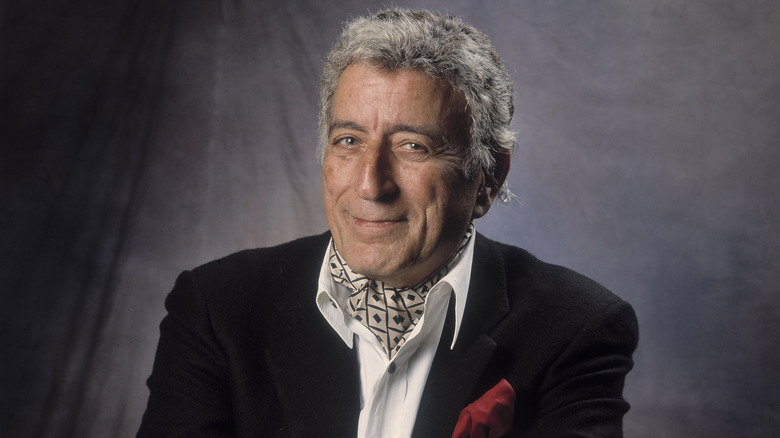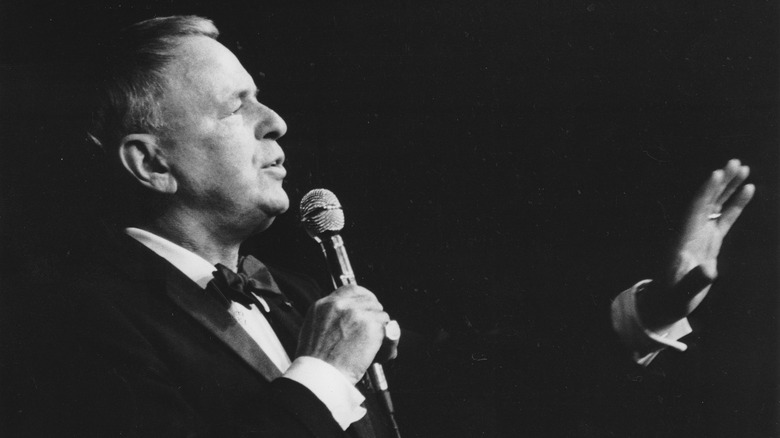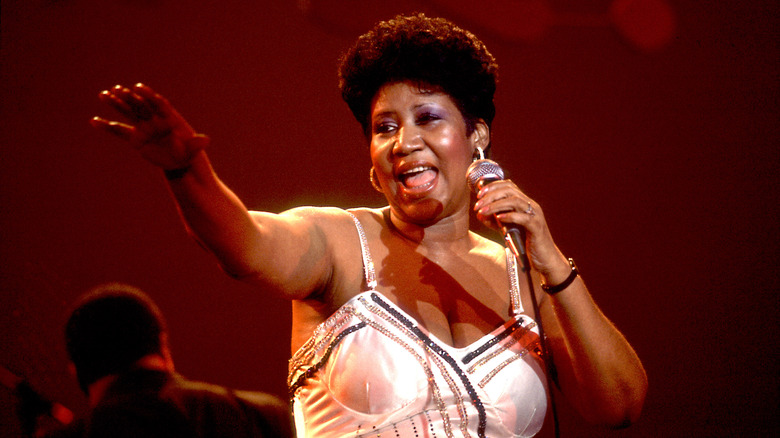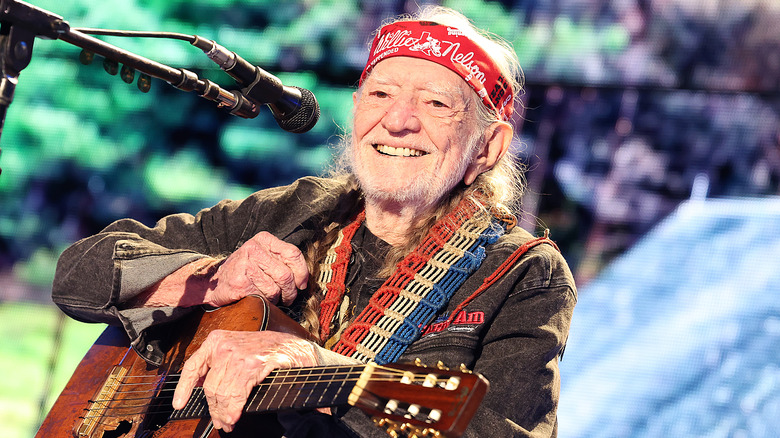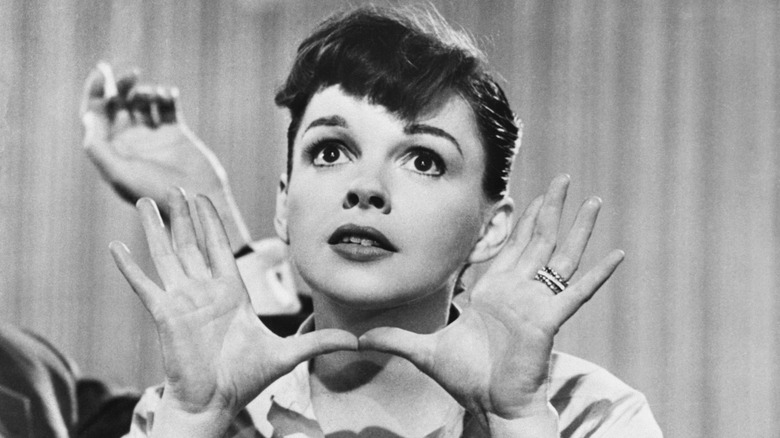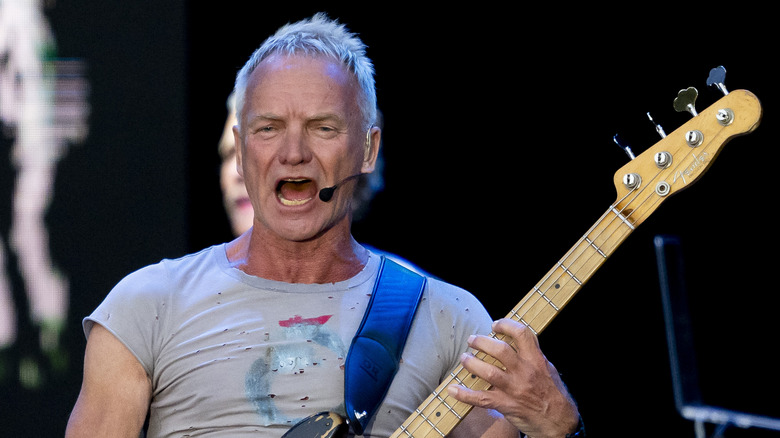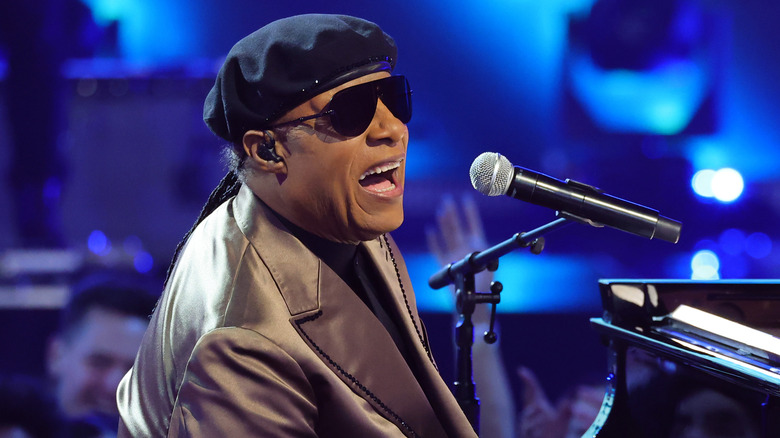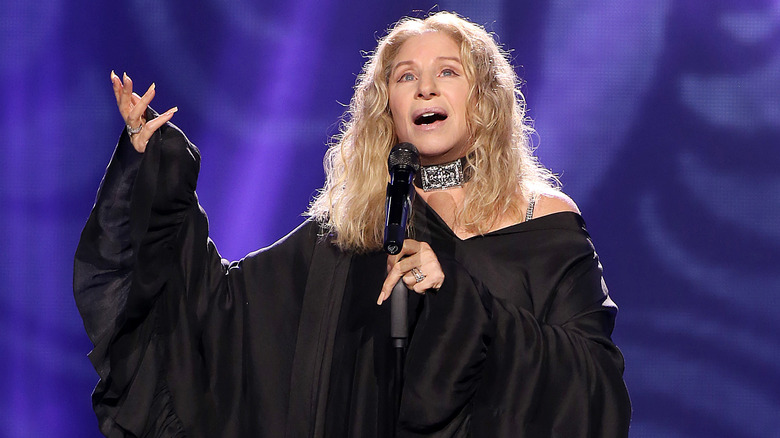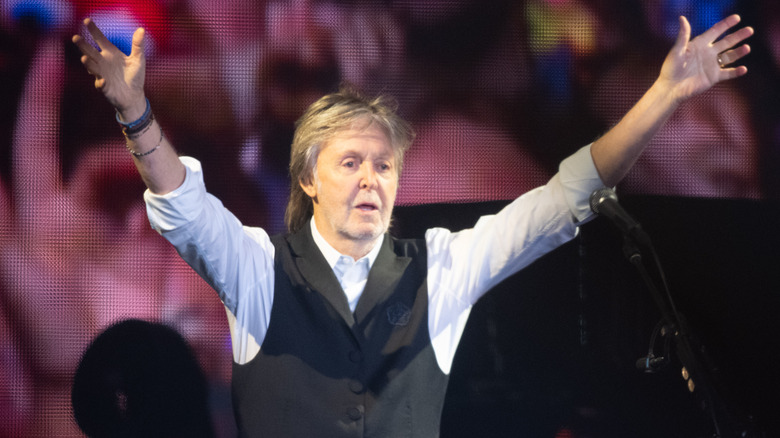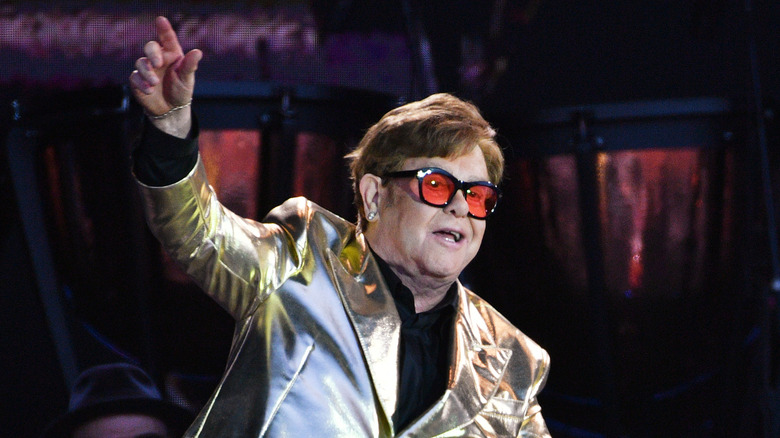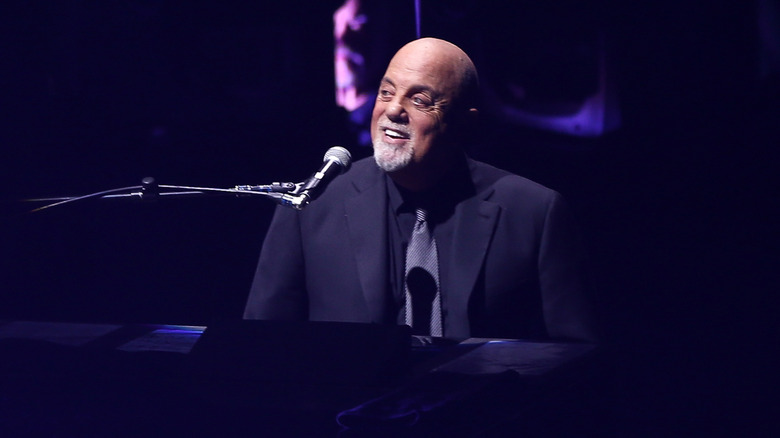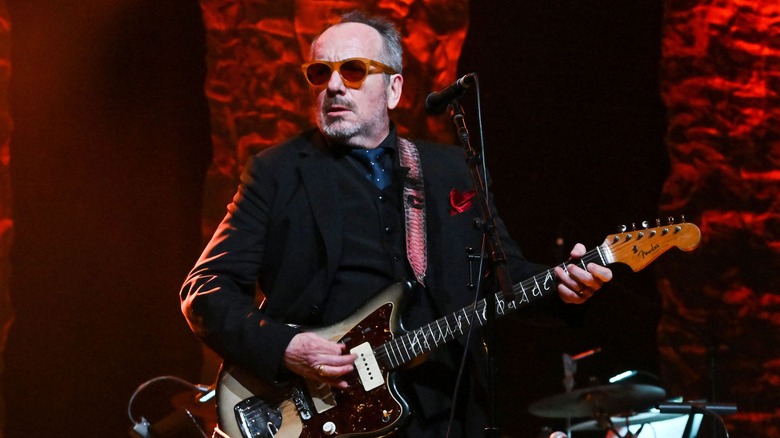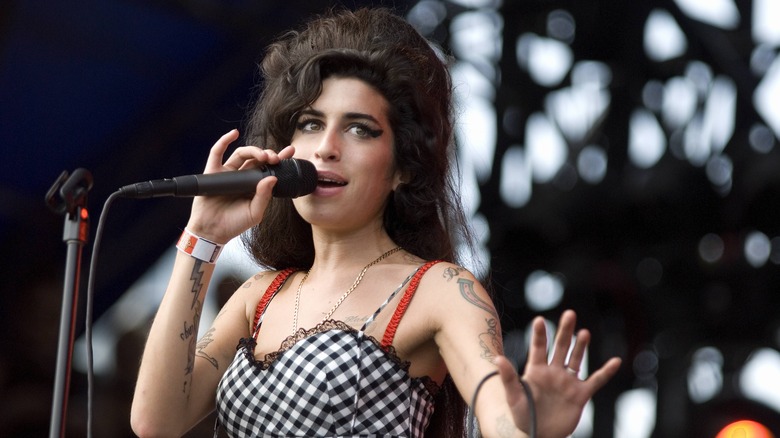12 Iconic People Tony Bennett Had Duets With
Few vocalists were as classic, and classy, as the late, great Tony Bennett. He rose to fame in the early '50s, in large part due to the jazz records he made for Columbia during that decade — but Bennett was nothing if not a versatile singer, and in 1962, it was a pop song, "I Left My Heart in San Francisco," that catapulted him to superstardom. It marked the true beginning of a career defined by Bennett's eagerness to always try new things, as he explained to The San Diego Union-Tribune in a 1997 interview. "I change from moment to moment. That applies to my whole repertoire," he said. "I know how to improvise and I really depend on the music around me to inspire me. So that every night ... you bob and weave, or zig and zag, and never do the same thing the same way, ever."
Part and parcel of this philosophy was Bennett's mile-long history of duets with other artists, which culminated in a pair of iconic, Grammy-winning releases: 2006's "Duets: An American Classic" and 2011's "Duets II." (Many of these performances were captured for PBS specials centered on the recording of the albums, and they are universally awesome.) The list of artists who have lined up to work with Bennett was ridiculously extensive, from George Michael to Lady Gaga to Michael Bublé — and among them have been more than a few that were nearly as iconic as the man himself.
Frank Sinatra
It may not be terribly surprising to learn that Tony Bennett, a quintessential New Yorker, was most profoundly influenced by another legendary singer fitting that description: the Chairman of the Board himself, Frank Sinatra. As a young man, Bennett idolized Sinatra; in a 1991 interview with Fresh Air (via NPR), he remembered their first meeting, backstage at one of Sinatra's shows, where the experienced performer gave the young upstart a bit of simple, yet profound, advice. "[Sinatra] gave me some wonderful advice about not worrying about being nervous because he said the public likes that," Bennett recalled. "He said, 'If you're nervous, they're going to see that you care. So they're going to root for you. And the more they root for you, the more you'll give back to them ... And it'll just be fine.' And it was wonderful advice."
Sinatra was actually the first to release an LP titled "Duets" in 1993 — and along with such stars as Bono, Liza Minnelli, and Carly Simon, Bennett was invited to participate. He dueted with Ol' Blue Eyes on one of his signature tunes — "New, York, New York," that swinging, bombastic ode to the city that shaped them both. The admiration was mutual; all the way back in 1965, Sinatra said in an interview with Life Magazine, "For my money, Tony Bennett is the best singer in the business. He excites me when I watch him. He moves me. He's the singer who gets across what the composer has in mind, and probably a little more."
Aretha Franklin
For any singer, there is pretty much no higher praise than to be compared to Aretha Franklin, the Queen of Soul. She is the standard by which powerhouse vocalists like Whitney Houston and Mariah Carey are measured; one can easily make the case that she's the greatest vocalist in the history of popular music, simply by pointing to the time she filled in for ailing opera legend Luciano Pavarotti to sing the ridiculously challenging aria "Nessun Dorma" at the 1998 Grammys at a moment's notice, and killed it. Hers is the kind of talent that can humble even the most talented singers — so it's a testament to Tony Bennett's greatness that she was humbled by him.
Franklin appeared on "Duets II" performing the 1982 James Ingram and Patti Austin tune "How Do You Keep the Music Playing," and in a joint interview with CBS News, the pair spoke quite highly of working with each other. "It's wonderful just to sing with such a legendary voice," Franklin said of Bennett. "I think we make really wonderful music together." Bennett then dropped a praise bomb on Franklin, saying, "There's two or three people in the world that sounds just the way I'd like to hear a singer sing the right way and she's one of the three." Franklin responded the way anyone else would have, simply saying, "Wow — thank you."
Willie Nelson
Even if country music isn't your bag, chances are you still have a soft spot in your heart for the great Willie Nelson. He's simply one of the best songwriters in any genre, his plaintive voice is unlike any other, and he's one of the few people on the planet who can match his buddy Snoop Dogg in both coolness and weed tolerance. For "Duets II," Nelson sat in with Tony Bennett on the lovely standard "On the Sunny Side of the Street," and the performance is just as endearing as one would expect. The two legends clearly enjoyed sharing the stage, and it must be noted that Nelson acquitted himself quite well as a crooner, also ripping off a dizzyingly jazzy guitar solo.
After the recording, Nelson compared the experience to his formative ones as a young musician. "What I really noticed about today's recording, what I really liked about it, it's like working some small club," he said. "There could be people over there at tables, and a couple of drinks or whatever, and [it's] very natural ... I enjoy doing music that way."
Judy Garland
For a New York icon, it's a little ironic that it was an ode to the City by the Bay that became Tony Bennett's signature tune. "I Left My Heart in San Francisco" was penned by songwriters George Cory and Douglass Cross, and was offered to several singers before it was introduced to Bennett by his pianist Ralph Sharon in 1961. Bennett recorded it early the following year, and the rest, as they say, is history: It became a top 20 hit, won Grammy awards for record of the year and best male solo vocal performance, and became forever associated with Bennett.
On a 1963 episode of legendary actress and singer Judy Garland's CBS variety show, Bennett appeared to duet with her on the tune; it was a sweet, heartfelt performance during which the pair's friendship was obvious. In his 2012 memoir "Life Is a Gift: The Zen of Bennett," Bennett remembered Garland, who tragically passed away at only 47 in 1969, in the fondest of terms. "One of the best compliments I ever received was from Judy," he wrote. "She said that I was 'the epitome of what entertainers were put on Earth for. Tony was born to take peoples' troubles away' ... Given my respect for Judy and her talent, this was high praise indeed, and I always cherished her statement."
Sting
There are few voices in rock more distinctive than that of former Police frontman and wildly successful solo artist Sting, and on Tony Bennett's first "Duets" album, he appeared to sing with the legend on "Boulevard of Broken Dreams," a 1930s standard that is just as melancholy and atmospheric as its title. The result is absolutely mesmerizing — although it seems unlikely on paper, it's clear that Sting was influenced by Bennett, and his gift for harmony shines through powerfully, with his voice and Bennett's blending in just as compelling a way as one would expect.
In 2021, Sting released his own "Duets" album, which paired the singer with such icons as Annie Lennox, Herbie Hancock, Julio Iglesias, and Mary J. Blige. Speaking with AARP about the project, Sting hearkened back to his collaboration with Bennett, who obviously was a strong influence on its very conception. "I always put myself in the position of a student," he said. "When I sing with Tony Bennett, I am singing opposite the great master of phrasing. I'm just so happy to be learning from him. These are people whose records I bought as a kid. It's not intimidating. It's just wonderful."
Stevie Wonder
"For Once in My Life," penned by Motown songwriters Ron Miller and Orlando Murden, has long been the subject of controversy due to it being unclear who was actually the first to sing the song — but for Tony Bennett, who recorded the tune for a 1967 album of the same title, there's little question who sang it the best. Stevie Wonder, who scored a hit with his version in 1968, appeared on "Duets" to sing it with Bennett, and on the occasion of the recording, Bennett remembered being unsurprised that Wonder had enjoyed slightly more success with the song than he had. "I introduced the song," Bennett said. "I recorded it, and Stevie was smart enough to put a beat behind it, an uptempo [beat], and it became a million-selling record."
During their performance, Wonder engaged in some slightly subdued yet characteristically muscular vocal acrobatics, which seemingly pushed Bennett to reach for the top of his own range, resulting in a stunningly powerful rendition of the tune. In the accompanying interview, Wonder pointed out something that's often overlooked about Bennett. "You were fighting about conditions of oppression, civil rights and social injustices ... long before it was popular," he told Bennett. "You stepped out, and you spoke on it ... I have to say that I have much respect for you as a human being."
Barbra Streisand
Barbra Streisand has truly done it all; she's a Tony-winning Broadway performer, a two-time Oscar-winning actress, and an eight-time Grammy winner who has sold over 90 million albums. It's safe to say that her legacy as an entertainer is secure, but she never had occasion to work with Tony Bennett — until "Duets," for which the vocalist persuaded Streisand to take part in a version of "Smile," the lovely standard based on music originally composed by Charlie Chaplin for his classic film "Modern Times." Their performance was, as expected, a jaw-dropping voal showcase — but in the book "Artists on Recording Techniques" by Jeff Touzeau, Bennett explained to the author that Streisand wasn't initially on board with the song selection.
"We did that song at her home out in Malibu on a beautiful day," he remembered. "Barbra didn't really understand why I chose that particular song, so I explained that even though the song was written many, many years ago ... it still has particular relevance today." He cited its message of persevering in the face of hardship as being particularly resonant at the time, as 9/11 had happened just a few years prior — and said that once he brought Streisand around, "she sung it beautifully — she smacked it right out of the ballpark."
Paul McCartney
Musicians don't come much more iconic than the great Paul McCartney, who was coming up with a little band called The Beatles at the time that Tony Bennett was already a superstar. Bennett tapped McCartney to sing with him on his first "Duets" album, and the pair selected a classic standard: "The Very Thought of You," penned by a major contributor to the Great American Songbook, Cole Porter. In their sit-down for the "Duets" PBS presentation, McCartney explained that Porter was a bridge between the artists of Bennett's generation and his own. "[People] expected me to have more contemporary heroes," he said, "But he's the great writer." Bennett agreed, saying, "That's what we try to tell all the young people — if you don't know the past, how can you know the future?"
The duo's rendition of "The Very Thought of You" is, of course, pure elegance and sophistication, and in "Artists on Recording Techniques," Bennett waxed fondly about his time working with McCartney. "Paul's got it," he said. "He's just a natural, and I love him. He's got a great sense of humor and a great heart." Upon Bennett's death, McCartney took to Instagram to pay tribute to his friend, writing, "He was always a wonder to behold. Thanks Tony for the joy you brought to our world."
Elton John
In 1953, Tony Bennett scored a major hit with "Rags to Riches," a big-band barnburner that was arranged for his recording by iconic bandleader Percy Faith. As detailed in the biography "All the Things You Are: The Life of Tony Bennett," by David Evanier, the crooner couldn't stand the song at first — but he warmed up to it in time, possibly due to the fact that it went gold and held down the top spot on the pop chart for eight weeks. For "Duets," he called in a nimble singing partner and ace pianist to assist on the tune: Elton John, who blew Bennett away not just with his chops, but with his peerless professionalism.
In their interview for the "Duets" PBS presentation, Bennett said, "It's amazing how prepared Elton John was. He came in, and in three takes, we were finished ... He had rehearsed it, I could tell, and he sat down at the piano and played it before we recorded it." He went on to describe how the pair hit it off, and John — who, as of this writing, just wrapped up a titanic farewell tour at the age of 76 — expressed astonishment that Bennett, who at the time was 80, could still sing circles around just about anybody. "He's just the coolest guy on the planet," he said. "He's got the greatest voice, he still sings amazingly — I mean, to have those chops at 80 is incredible."
Billy Joel
Billy Joel is another artist who is inextricably linked with the Big Apple, so it's only fitting that he has partnered with Tony Bennett on multiple occasions. On the 2001 album "Playin' WIth My Friends: Bennett Sings the Blues," the Piano Man teamed with Bennett on a tune that, while one of Joel's signatures, seems custom-made for Bennett: the wistful, melancholy anthem "New York State of Mind." Of course, a New York icon like Bennett lending his voice to Joel's classic tune added an extra element of poignancy and elegance — and in 2008, during a concert at Shea Stadium, Bennett even joined Joel onstage to perform the song, sending the ginormous crowd into an absolute frenzy.
Their partnership continued on "Duets," for which Joel sat in with Bennett on "The Good Life," which had been a hit for the latter in 1963. Despite the fact that the two were quite familiar with each other by this time, Joel expressed amazement in the interview segment for the "Duets" PBS presentation that Bennett does not, in fact, play the piano — or any other instrument. "Tony sings like he's a player," Joel said. "He's hearing all the notes in the chord. He's got a full palette to pick from." In reference to Bennett's voice, Joel marveled, "He's obviously learned his instrument well."
Elvis Costello
The great Elvis Costello is one of the few performers who might be able to challenge Tony Bennett's coolness quotient, and the English rocker has joined forces with Bennett on more than one occasion. In 1983, Bennett pulled a star-struck Costello up onstage during a performance with the Count Basie Orchestra to join him in a rendition of "It Don't Mean a Thing (If It Ain't Got That Swing)." Years later in 1994, Costello took part in the festivities when "MTV Unplugged" featured Bennett, an appearance that brought renewed attention to the legendary crooner and yielded an album that took home Grammys for album of the year and best traditional pop vocal performance. Costello sat in on a rendition of the 1937 George and Ira Gershwin classic "They Can't Take That Away From Me," before which Bennett joked that they were going to be singing the song to a particular girl they both happened to be pursuing.
Bennett invited Costello back years later for "Duets," performing a song that he had originally recorded in the '50s: "Are You Havin' Any Fun," a lively standard poking fun at the rich man who has everything except, well, happiness. Their performance is pure magic, with the two clearly enjoying being in each other's company, each cracking the other up on multiple occasions.
Amy Winehouse
Perhaps the most poignant of all Tony Bennett's duets: a rendition of the standard "Body and Soul" recorded for "Duets II" with the late, great Amy Winehouse. As detailed by the Philadelphia Inquirer (via Far Out Magazine), those in Bennett's circle were a touch hesitant to invite Winehouse down to the studio, as it was well-known that she was at the time struggling mightily with the alcohol addiction that would soon claim her life. Bennett insisted, and he recalled that when Winehouse arrived, she was sober, professional — and terrified to even be in Bennett's presence. "She said she was nervous because she had never recorded a song with someone she considered one of her idols," Bennett told the Inquirer. "After running through a few bars, she said she hadn't recorded for a long time — her only reference to the problems she'd been living through."
During the performance, one can actually see Winehouse's nerves melting away as Bennett begins to sing, at times closing her eyes and smiling from ear to ear. When it's her turn at the microphone, it's clear that whatever she may have been going through at the time, she is fully, completely in the moment — and her legendary voice had never been in better form. The recording scored a Grammy for best pop duo-proup performance — and it was, unfortunately, Winehouse's last.
If you or anyone you know is struggling with addiction issues, help is available. Visit the Substance Abuse and Mental Health Services Administration website or contact SAMHSA's National Helpline at 1-800-662-HELP (4357).
